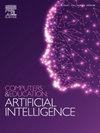基于人工智能的学业成功预测:对许多人有利,对某些人不利?
Q1 Social Sciences
Computers and Education Artificial Intelligence
Pub Date : 2024-09-19
DOI:10.1016/j.caeai.2024.100303
引用次数: 0
摘要
使用计算工具来预测学业成绩已变得越来越流行。根据过去的学习历史进行训练的机器学习算法已被证明可以提供有效的预测。然而,由于算法中存在偏差和不公平现象,我们应该对这些预测进行更仔细的研究。本文探讨了学业成功的预测准确性在特定学生群体中的差异程度,重点关注在学校未获得高等教育入学资格的传统学生和非传统学生(NTS)。在案例研究中,该研究比较了几种流行的算法及其预测质量,并调查了被误分类的非传统学生是否表现出积极或消极的偏差。结果显示,预测非应届毕业生学业成功的准确率明显低于整体考虑所有学生时的准确率。由于案例数量较少,无法准确确定失真的方向。该研究强调,在预测学习成功时,必须始终考虑到存在偏差的可能性,而且在使用此类工具时必须确保不存在可能影响某些学生的不良偏差。本文章由计算机程序翻译,如有差异,请以英文原文为准。
AI-based prediction of academic success: Support for many, disadvantage for some?
The use of computational tools to predict academic success has become increasingly popular. Machine learning algorithms, trained on past study histories, have been shown to provide valid predictions. However, knowing about biases and unfairness in algorithms, one should take a closer look at these predictions. This paper explores the extent to which the predictive accuracy of academic success varies between specific groups of students, focusing on traditional and non-traditional students (NTS), who have not acquired a higher education entrance qualification at school. In a case study the study compares several popular algorithms and their prediction quality, and investigates whether misclassified NTS show positive or negative biases. Results revealed that the accuracy of predicting academic success for NTS was significantly lower than when considering all students as a whole. The direction of the distortion cannot be determined exactly due to small case numbers. The study emphasizes that the possibility of bias always has to be considered when predicting study success, and the use of such tools must ensure there are no undesirable biases that could affect certain students.
求助全文
通过发布文献求助,成功后即可免费获取论文全文。
去求助
来源期刊

Computers and Education Artificial Intelligence
Social Sciences-Education
CiteScore
16.80
自引率
0.00%
发文量
66
审稿时长
50 days
 求助内容:
求助内容: 应助结果提醒方式:
应助结果提醒方式:


